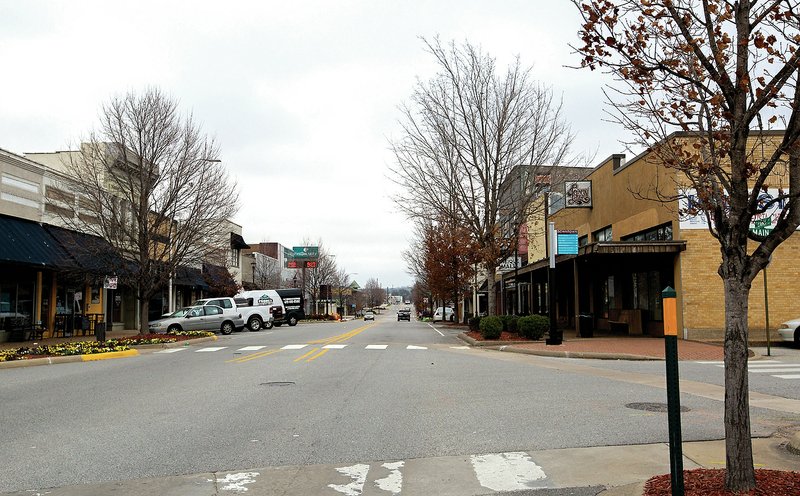Springdale and its Emma Avenue once were the centerpiece of commerce in Northwest Arkansas.
"Emma became the heart of Springdale," said Susan Young, the outreach coordinator for the Shiloh Museum of Ozark History, which stands near the site of the original town square. "It was always used for the public good."
Young shared a history of Springdale and Emma Avenue in a recent program at the Springdale Public Library.
The St. Louis-San Francisco Railroad opened its depot in 1881 on the north side of Emma, Young said, the site of the Arkansas & Missouri Railroad's offices and shops now. "It was a huge boost to the economy. Farmers could more easily ship out their produce to bigger markets."
Soon a blacksmith shop and grocery store located elsewhere in the city moved to Emma to be closer to commerce.
"Emma was a busy business place into the 1960s," Young said. "People came to Emma for everything and anything they needed -- if they needed to go to the dentist, if they needed a hair cut. They came to Emma to buy clothes, and there was even a movie theater.
"Caudle Avenue was the outskirts of town," Young said. "But (fruit) growers could go there to get cash for their produce. Those from small towns surrounding Springdale came to Emma for their trading and shopping. They didn't go to Fayetteville."
Agriculture fueled the Springdale economy pretty much throughout history, as it does now. Strawberries and peaches were successful crops, and west of Springdale, in Tontitown, the vines hung heavy with grapes. Italians first came to Springdale in 1898, and by the early 1900s, grapes were growing so well, Welch Foods opened a plant in Springdale, Young said.
In the late 1800s to the early 1900s, apples were "big, big," Young continued. "The area was covered in apple trees, and the air was fragrant with the smell of apple blossoms. It was a lovely place to live."
But in the 1920s, the perfect storm of frost, disease and insects wiped out the apple trees.
"How was a small farmer to make a living?" Young asked. "They turned to chickens.
"It paid off, and for that reason, Springdale is known as the poultry capital."
"In the early 1930s, John Tyson started the predecessor to Tyson Foods using his old truck to haul chickens out of the area to sell for farmers who owned hatcheries," according to the Encyclopedia of Arkansas History & Culture. "Jeff Brown opened the first hatchery in 1921, and by 1937, it was the largest in the state."
Both companies had offices on Emma Avenue.
Brown focused on developing feed to grown healthy, vibrant chicks, Young said. C.L. George (George's Inc.) very early developed a successful system for hauling live chickens to market. Harvey Jones and his Jones Truck Lines became leaders in refrigerated transport to carry processed chicken across the country.
Tyson Foods today ranks as the largest protein producer on the planet thanks to its vertical integration system. The company owns every phase of the project -- from chicks, to feed, to processing, to transport, Young explained.
"But why Springdale," Young asked.
"It lay in the center of the United States and near the corn belt," she answered. "The land was poor, and the people were poor, with no other way to make a living. They turned to the hard, risky job of raising chickens."
Enter Shelby Ford, known as the "chicken banker -- he loved that," Young said. For most bankers, loaning money on a crop that could be wiped out in an instant due to weather or disease seemed ridiculous, but Ford had confidence in his friends and neighbors.
"He grew up beside these chicken farmers," Young said. "He went to church with them, had coffee with them. He knew the families. He was willing to loan money to friends." Today, Ford is honored with a bust-style statue in Murphy Park.
After World War II, Springdale (and much of the Northwest Arkansas area) still supported an agricultural economy. Joe Steele and Shadye and Earl Allen started family businesses and built facilities to can and preserve tomatoes, green beans and spinach grown in the region.
During most of this time, the population of Springdale couldn't provide enough workers for local agriculture and its related industries (processing, trucking). "There was a time, fairly recent in history, when there weren't enough people to do the jobs," Young said.
Some families followed the crops at harvest, and tiny wooden cabins were built on land that now holds the Springdale Municipal Airport. In modern times, a new culture has migrated to Springdale to supply the poultry processing plants with labor.
"In the 1960s, Emma was still thriving," Young said. "People would still go to Emma to shop -- they would only go to Fayetteville to pay their taxes. Springdale was the market of the central Ozarks, the Main Street of Northwest Arkansas."
Today, an effort is underway to revive Emma Avenue and downtown Springdale, a partnership between city government and the Downtown Springdale Alliance. Many efforts surround the portion of Razorback Greenway which crosses Emma Avenue and runs near Shiloh Museum and developing and redeveloping city parks. The Jones Center, the Rodeo of the Ozarks, the Arts Center of the Ozarks and the museum anchor the district. The Arkansas & Missouri Railroad boards excursion trains on Emma. Banks, insurance agents, boutiques and antique stores and several cafes renew the service in Springdale -- and more are planned. Emma Avenue even boasts a stop on the Springdale Taco Tour. Through it all, Team Springdale positively promotes the city through social media.
Springdale, we've got a lot to be proud of.
NAN Our Town on 04/16/2015

